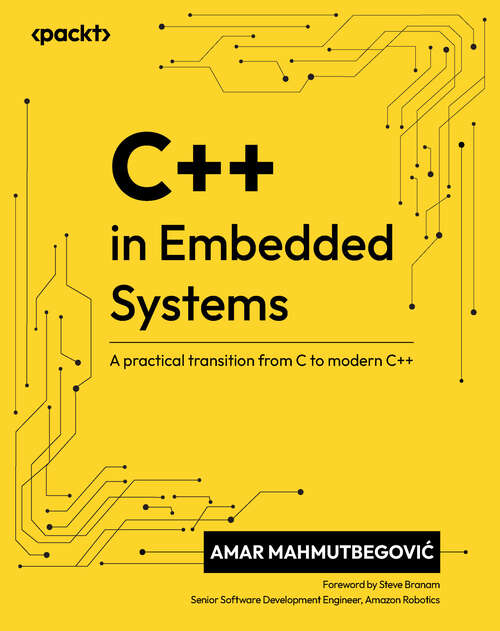C++ in Embedded Systems: A practical transition from C to modern C++
By:
Sign Up Now!
Already a Member? Log In
You must be logged into Bookshare to access this title.
Learn about membership options,
or view our freely available titles.
- Synopsis
- Go beyond C by applying modern C++ in embedded systems to enhance code readability, maintainability, and scalabilityKey FeaturesBridge the gap between C and modern C++ for embedded systems through practical examplesLearn how to save memory and cut down on runtime computing using compile-time computation techniquesImprove your software design skills by applying patterns to solve common problems in embedded systems using C++Purchase of the print or Kindle book includes a free PDF eBookBook DescriptionTransitioning from C can be daunting, with concerns about performance overhead, added complexity, and unfamiliar tooling. Addressing these challenges, Amar Mahmutbegovic, an advocate for modern C++ in embedded development, shows you how to harness zero-cost abstractions, compile-time checks, and powerful modern C++ capabilities to preserve performance while achieving safer, cleaner code. This book bridges the gap between traditional C and advanced C++, helping you retain the efficiency C developers demand while unlocking the safety and expressiveness of modern C++. Starting with a modern development environment setup, including a Docker container for seamless example replication, you’ll overcome the hurdles of using the C++ standard library in memory-constrained settings and get acquainted with the Embedded Template Library (ETL) as an alternative. The book walks you through essential C++ concepts before exploring advanced topics such as templates, strong typing, error handling, compile-time computation, and RAII. Through practical examples, you'll implement a sequencer, write a type-safe HAL, and apply patterns like Command, State, and Observer to solve common embedded development problems. By the end of this book, you’ll have learned how to apply modern C++ to develop robust, modular firmware with performance matching or exceeding hand-coded C solutions.What you will learnDebunk myths and misconceptions about using C++ in embedded systemsSet up build automation tailored for C++ in constrained environmentsLeverage strong typing to improve type safetyApply modern C++ techniques, such as Resource Acquisition Is Initialization (RAII)Use Domain Specific Language (DSL) with a practical example using Boost SMLImplement software development best practices, including the SOLID principle, in embedded developmentWho this book is forThis book is for embedded developers who primarily use C and want to adopt a modern C++ approach. It introduces fundamental C++ concepts, making it suitable for beginners, while also assuming basic familiarity to fully leverage advanced features like compile-time computation. Even those with prior C++ experience will discover new ways to apply modern best practices to write more efficient and maintainable embedded applications.
- Copyright:
- 2025
Book Details
- Book Quality:
- Publisher Quality
- Book Size:
- 402 Pages
- ISBN-13:
- 9781835881156
- Publisher:
- Packt Publishing
- Date of Addition:
- 08/05/25
- Copyrighted By:
- Packt Publishing
- Adult content:
- No
- Language:
- English
- Has Image Descriptions:
- No
- Categories:
- Nonfiction, Computers and Internet
- Submitted By:
- Bookshare Staff
- Usage Restrictions:
- This is a copyrighted book.
- Foreword by:
- Steve Branam
